Three Sustainable Horticulture Tips
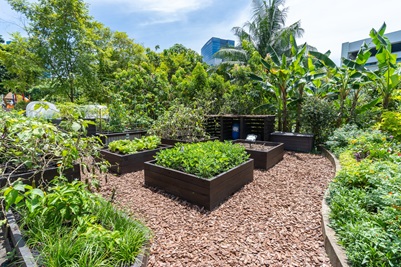
Visit the crop rotation plot within the Valley of Edibles in HortPark to learn about sustainable horticulture.
As we transform Singapore into a City in Nature, we are seeing a growing interest towards edible horticulture. But while gardening with edible plants is a fun and rewarding activity that can produce harvests for you to enjoy and share with your community, how can we do this in a more sustainable manner?
Here are some useful tips you can adapt for your edibles garden. With them, gardeners can grow edibles that are not only good for consumption, but also good for our environment.
(1) Installing Crop Covers
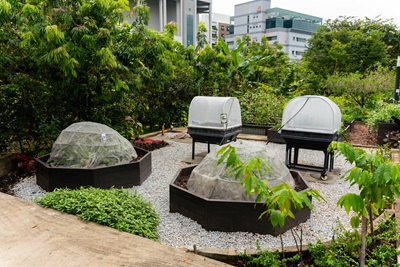
One of the most efficient ways to prevent plant pests is to install crop covers. This method of protected cultivation relies on placing a physical netting to prevent pests from accessing the edibles and can help cut down on a reliance on chemical pesticides to manage them.
(2) Practice Crop Rotation
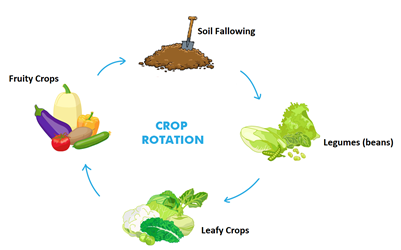
Crop rotation is an organic method that can prevent recurring plant diseases. What’s more, it does not require any use of chemical treatments. As plant pathogens are selective towards their plant hosts, changing to a different family of crop will significantly reduce the transmission of plant diseases.
(3) Practice Companion Planting
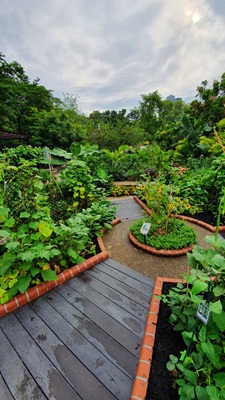
Companion planting brings mutual benefits and reduces the need for chemical treatments.
The concept of companion planting can help to reduce the use of chemical treatments. When certain plants are grown adjacent to one another, mutualistic beneficial properties may arise.
For example, a popular combination of companion plantings uses corn, beans and pumpkins. Here, corn provides structure for the beans to climb, while the beans fix nitrogen from the air into the ground to enrich the soil. Meanwhile, the pumpkin’s broad leaves provide shade that acts as weed management.
For more sustainable horticulture tips, head on down to the Valley of Edibles at HortPark. Within the Valley of Edibles is the Edible Garden, which brings visitors on a journey through various edibles plots showcasing various leafy, colourful vegetables and heirloom varieties that can be used in our daily culinary dishes.
The Valley of Edibles also demonstrates sustainable gardening practices for mini gardens, which are highly useful for our urban landscapes. You can take a virtual tour from the comfort of your home.
Join In Gardeners’ Day Out
Participate from the comfort of your home with online activities such as talks and demonstrations, video tutorials of activities and promotions offered. Free guided tours will also be offered on site (with safe management measures). Enjoy Gardeners’ Day Out online at www.nparks.gov.sg/GDO.
You can also enjoy our Gardening With Edibles Masterclass Series from your home. They are conducted by NParks horticulturists, focusing on unique and challenging edibles across different plant families.
Gardening with Edibles
The City in Nature vision seeks to bring greenery closer to all residents. The community plays a key role in the ownership and stewardship for nature which will benefit our health and well-being.
NParks is partnering residents to make Singapore our City in Nature and spark a love for community gardening through the Gardening with Edibles initiative under the Edibles Horticulture Masterplan. Since the initiative’s launch in June 2020, some 860,000 free seed packets have been distributed to interested members of the public. The programme was established by founding partners DBS Bank and Tote Board through the Garden City Fund, a registered charity established by NParks. The most recent round of seed distribution, which took place in December 2021, was made possible by the programme’s partner Singapore Post Limited, also through the Garden City Fund. Relevant resources are available online, to guide gardeners along the way.
The Gardening with Edibles initiative is aligned with Singapore’s national strategy to strengthen our food resilience. The “30 by 30” goal, led by the Singapore Food Agency, aims to produce 30% of Singapore’s nutritional needs locally by the year 2030.
Also, NParks is expanding the allotment gardening scheme and the Community in Bloom programme, to welcome even more residents into the gardening family."
Learning More
If you are a gardening newbie, visit NParksSG, our refreshed YouTube Channel that serves as a one-stop repository for close to 300 video resources. It covers topics ranging from types of soil needed for your garden and how to plant, harvest and even cook your edibles.
How can you make your garden more welcoming to bees? Learn more here.
Keep your garden safe from attack by insect pests. Learn more about five such common pests of edible plants here.
For more information about the flora and fauna found in Singapore, please visit Flora and Fauna Web.
If you like what you read, follow us on Facebook, Instagram and Telegram to get the latest updates.
Text and photos from Jacky Loy


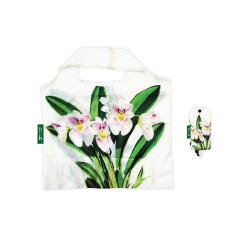
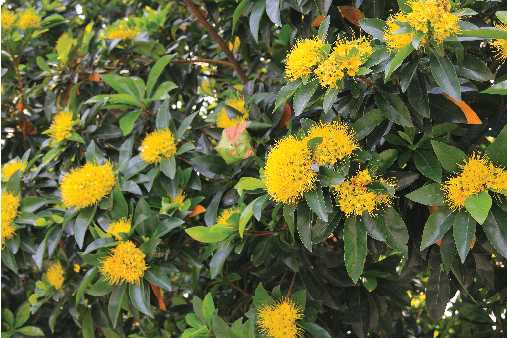

Have views or comments on this article? Let us know via this form. If you would like to give us feedback on any other areas relating to our parks and gardens, please submit via https://www.nparks.gov.sg/feedback